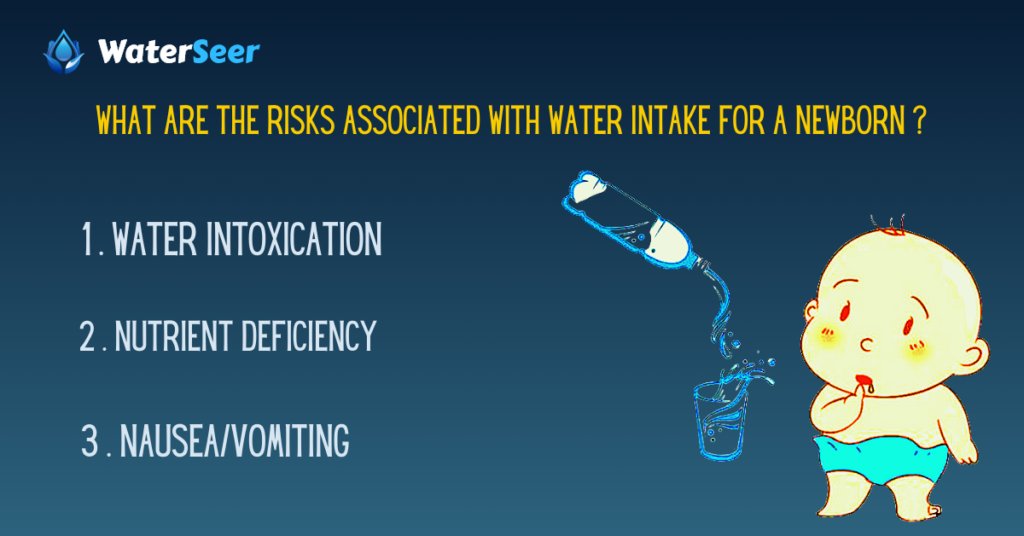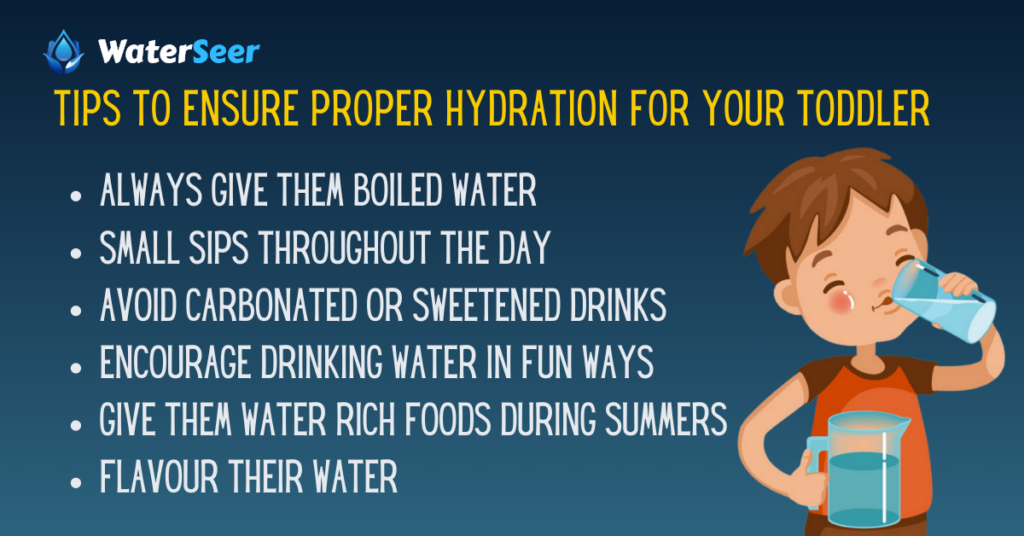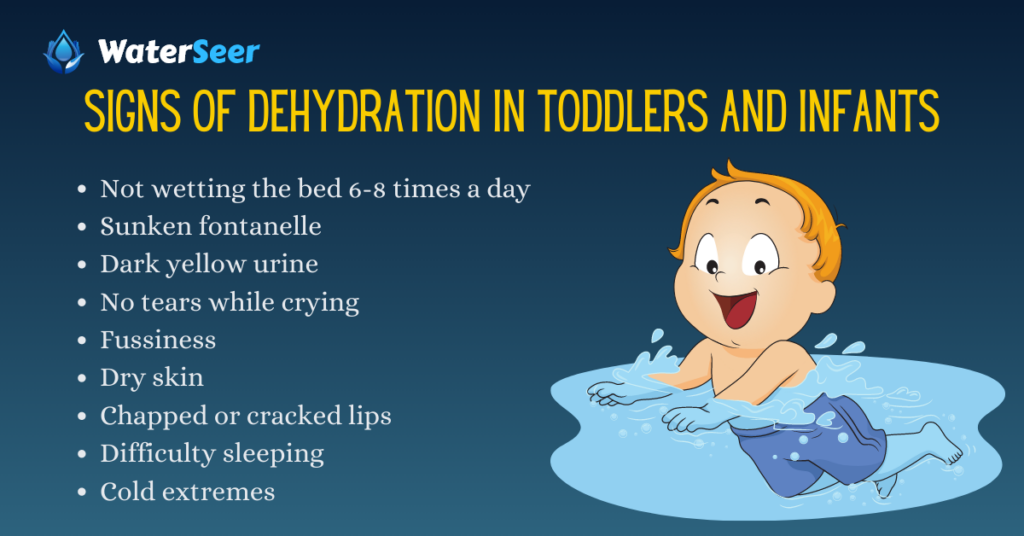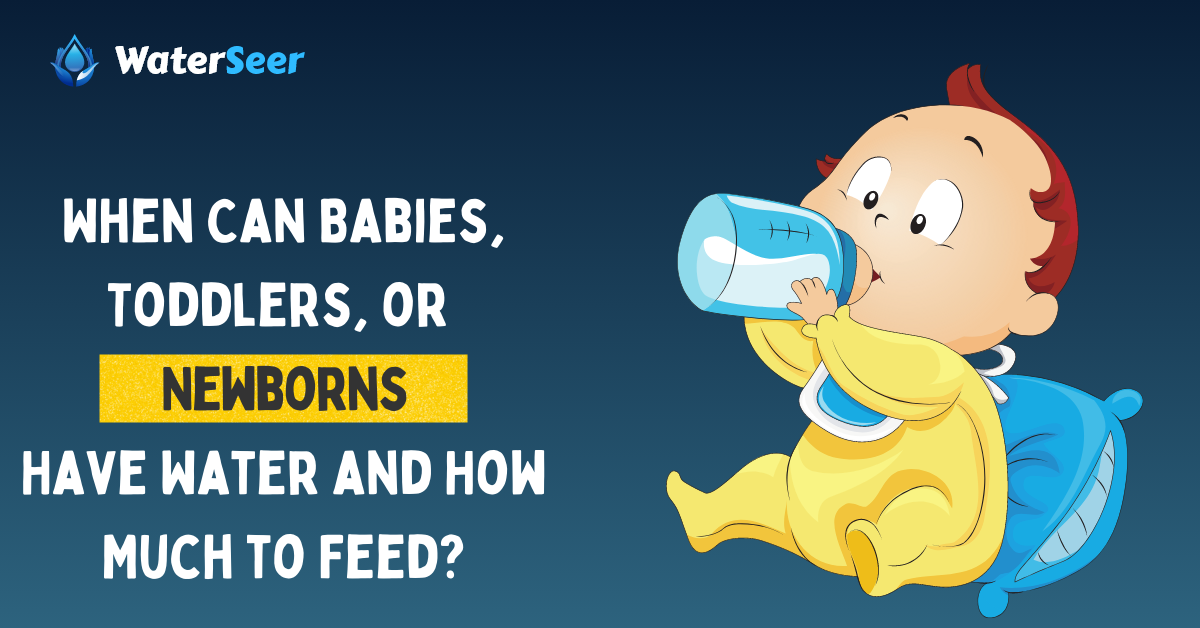Being a new parent comes with its fair share of challenges. And one of the biggest is to take care of your baby’s nutrition, diet, and health.
If you had a baby recently or are pregnant, you must already be concerned with what you can feed them, whether or not you should give them water, and if yes, when?
We’re here to answer everything you need to know about giving water to your newborn baby. So read on to find out how much water you can provide them, ways to keep them hydrated, and much more!
When Can Babies Have Water?
Babies can start having water after they’re about 6 months old. At this time, you can also feed your baby pureed foods. However, you shouldn’t stop breastfeeding them entirely and never use water as a complete replacement for breast milk when they’re at this age.
Can Babies Have Water Before They’re 6 Months Old?
No, you should not give your baby any water before they’re about 4 to 6 months old. Up until this age, they get all their nutrients from breastmilk or from a formula substitute, as recommended by a pediatrician.
Breast milk is also an excellent hydrating agent for babies. It contains 80% water and will give your baby all they need to stay hydrated throughout the day.
But what if you’re giving your baby formula substitute? Will it keep them appropriately hydrated too? The answer is yes. Most types of formula milk have instructions for adding specific quantities of water to them. As long as you follow these recommendations, you don’t need to supplement your baby with extra water.
In short, if you’re nursing your baby correctly while they’re 0-6 months old, you won’t have to feed them any water.
Risks Associated With Water Intake for a Newborn

Giving your newborn water before they reach the right age can have adverse consequences.
Water Intoxication
This condition is caused by electrolyte imbalance in your baby’s body. Drinking too much water can cause lower sodium levels in the body, resulting in seizures, brain damage, and in extreme cases, coma or death. The most typical symptoms of water intoxication are weakness, seizures, confusion, muscle cramps, twitching, and drowsiness.
Also Read:- What Is Distilled Water? Uses and Safety
Nutrient Deficiency
Babies who drink water might feel too full to eat anything else. They might suffer from nutrient deficiencies and insufficient weight gain if they forego other foods.
Nausea/Vomiting
If your baby fails to digest the water given to them, it might cause digestive issues, nausea, and vomiting.
How to Give Water to Babies When They’re 6-8 Months Old?
Once your little one turns 6 months old, it’s time to slowly incorporate water into their diet. Around this time, you should also start giving them pureed vegetables or baby food.
About 2-4 ounces of water per day is enough for a 6-8-month-old toddler. But since you’re adding this extra water to their diet, reduce their breast milk intake to 28-32 ounces a day.
The most common way of giving your baby water at this age is through a sippy cup. You should measure the amount of water you put in the cup and encourage your toddler to take little sips every once in a while.
How to Give Water to Babies When They’re 9-12 Months Old?
As your little one turns about a year old, their water intake should increase. They can start taking about 8 ounces of water a day.
Since your baby will be a lot more active during this time, you should also give them a variety of foods and start feeding them three whole meals a day.
Include easy-to-digest and nutritious foods in their diet and ensure they are well-hydrated. You can reduce their milk intake to about 16 ounces a day.
Remember, your baby won’t be able to communicate with you how much water they need. So you should be on the lookout for some signs. For example, if your baby is not eating food and constantly reaching for their sippy cup, they might be thirsty. Similarly, if they’re not passing bowels properly and grizzling (crying softly because of a stomachache), it might be a good idea to give them water.
How Much Water Should I Give to My 1+ Year Old Child?
As children grow, their water intake must also increase. You can follow a simple formula to know how much water your child needs at a specific age.
Your child’s age is the number of 8-ounce cups of water they should have per day. According to this rule, your 2-year-old should drink 2 cups, a 3-year-old should drink 3 cups, and so on.
| Age | Water intake per day |
|---|---|
| 6-8 Months Old | 2-4 ounces |
| 9-12 Months Old | 8 ounces |
| 1+ Year Old | 8 ounces |
| 2 Year Old | 2 cups |
| 3 Year Old | 3 cups |
Tips to Ensure Proper Hydration for Your Toddler

Once your baby turns the right age and starts drinking water, here are some tips you should follow to ensure adequate hydration.
1. Always Give Them Boiled Water
Children up to 12 months old do not have a robust immune system. They can’t fight off the pathogens found in unboiled tap water. Even purified water can contain pathogens.
So the best way to give your toddler water is by boiling it and then cooling it down. You should use the same water for preparing any baby foods or formula, too, at least until your child turns a year old.
2. Small Sips Throughout the Day
For adults, drinking a glass or two of water isn’t a big deal. But giving your baby all their day’s worth of water at once is not a good idea.
Try giving your toddler small amounts of water throughout the day. To do this, ensure that you do not fill your baby’s sippy cup to the brim.
Drinking too much water will make them feel full, and they won’t eat and breastfeed properly. As a result, they’ll not consume the right amount of nutrients.
3. Avoid Carbonated or Sweetened Drinks
Drinks containing soda or artificial sweeteners aren’t good for your toddler. They might be intrigued by the taste, but their immune and digestive systems aren’t well-equipped to handle such drinks.
So no matter what, do not give your baby any carbonated or soft drinks, especially when they’re just over 6 months.
4. Encourage Drinking Water in Fun Ways
Some babies do not take to the taste of water easily, and yours might be one of them. If that’s the case, even if you try giving them water, they’ll refuse to drink it.
In such instances, you should make drinking water fun for them. Give them an attractive sippy cup or play with them while encouraging them to sip water. You can also reward them with fruit when they take a few sips.
5. Give Them Water Rich Foods During Summers
Children aren’t very mindful of the amount of water they drink. As a result, they might not drink appropriate water even on hot days.
To ensure they don’t get dehydrated, give them water-rich foods like watermelons, melons, oranges, kiwis, grapes, etc. You can also make them lemonades when they’re a little older.
Including freshly churned fruit juices and light smoothies in their breakfast is excellent. You can include watery vegetables like cucumbers, zucchini, lettuce, and celery for lunch and dinner.
If you decide to include fruit juices in your toddler’s meals, make sure they aren’t sweetened and are always served in a controlled amount.
6. Flavour Their Water
We’ve already established that you can’t give your kids soda or soft drinks. But there’s nothing wrong with flavoring their water with real fruits.
If you infuse your baby’s water with fruits like strawberries, lemons, kiwis, berries, and cucumber, they’ll be much more likely to drink it.
Signs of Dehydration in Toddlers and Infants

Now that you know how to hydrate your baby, you should know some common signs of dehydration. Check them out below.
- Not wetting the bed 6-8 times a day
- Sunken fontanelle
- Dark yellow urine
- No tears while crying
- Fussiness
- Dry skin
- Chapped or cracked lips
- Difficulty sleeping
- Cold extremes
FAQs
At what age can you stop boiling water for babies?
Ans: For babies younger than 12 months, boiled and then cooled tap water is recommended. Boiling ensures the absence of any harmful pathogens in the water and keeps your baby safe. But once your baby turns a year old, their immune system is strong enough to fight these pathogens to an extent. Therefore, you can stop boiling their water.
Can you give newborns water?
Ans: Absolutely not! Newborns get the water they require from breastmilk or formula substitutes. Giving them any additional water can cause health issues in them. So do not feed your newborn any water before they’re at least 6 months old.
Can we give water to 3-month baby in summer?
Ans: No, you should not give your 3-month-old any water, even in the scorching summer months. If you’re nursing them the right way, they won’t need any extra hydration. You might, however, need to breastfeed them more frequently.
Can 1-month-old drink water?
Ans: No, a 1-month-old baby cannot drink water. You should only give breastmilk to babies that young and start giving them water only once they turn 6 months old.
When can babies drink tap water with formula?
Ans: You can use tap water to prepare your baby’s formula as long as you boil it. This is especially recommended for babies younger than 12 months. Tap water contains several impurities that only boiling can remove.
Even if you have a water purification system in your home, you should boil your baby’s water before you use it to make the formula milk because such purifiers do not remove all impurities from water.
Remember, you should not feed your baby unboiled tap water before they’re a year old. Also, do not give them any water before they’re 6 months old.
What if I accidentally gave my baby water?
Ans: Suppose you gave your younger-than-6-months old baby water accidentally. In that case, you should be on guard and monitor any signs of crankiness or sickness. If you feel like there’s something off about their behavior or they seem sick and cranky, consult a pediatrician.
In most cases, a little water won’t do lasting harm, but it can still be dangerous.
What if My Baby is Dehydrated?
Ans: If you’re breastfeeding/formula feeding your 6-month-old or younger baby correctly, there are meager chances of them being dehydrated. However, if you still suspect it, speak to your pediatrician immediately.
Conclusion
We hope we’ve answered all your queries about giving your newborn water. Follow all the above recommendations carefully when it’s finally time to feed your baby water. WaterSeer.org experts are always ready to help if you’re still unsure about something. Bookmark this article to come back to it when in doubt, and leave your questions and comments below!
Also Read:- What is Alkaline Water? Uses and Safety

